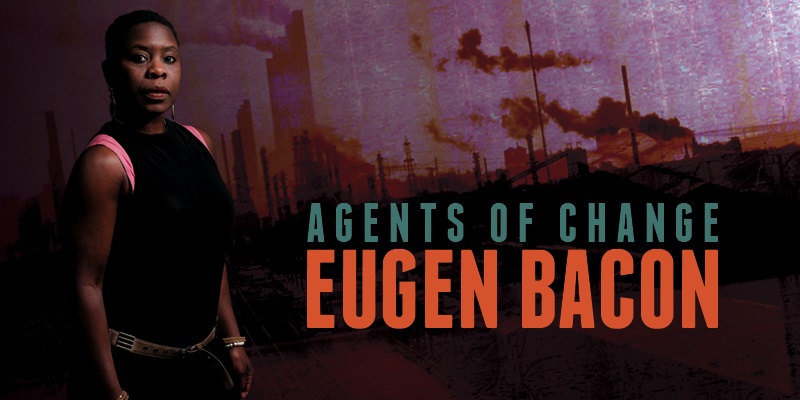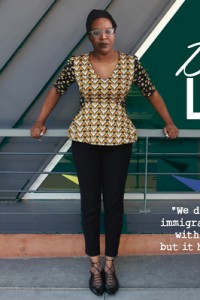Eugen Bacon: Agents of Change

EUGEN MATOYO BACON was born near Mt Kilimanjaro in Tanzania, and moved to Nairobi, Kenya, with her family as a toddler. Her parents and siblings later returned to Tanzania, but she stayed in Kenya at a boarding school run by German sisters. She studied Information Technology at Strathmore College and was awarded a scholarship to the University of Greenwich in the UK. She had her son at a hospital in Whitechapel, Tower Hamlets, in London. Later she moved to Melbourne, Australia, where she still lives and teaches writing, works as an editor, and juggles her own writing projects on top of a full-time day job. She has two master’s degrees (in computer science and creative writing), and a PhD in creative writing.
Bacon began publishing short fiction (as Eugen M. Bacon) in 2004 – the first being an award winner, ‘‘Morning Dew’’, through the Writers Bureau. She continued writing short stories, but her real breakthrough and access to literary journals came when she was studying creative writing at Swinburne University of Technology in Melbourne. Her short works, including prose poetry and microfiction, are collected in Hadithi & The State of Black Speculative Fiction (2020, with Milton Davies), The Road to Woop and Other Stories (2020), Danged Black Thing (2021), and Chasing Whispers (2022). She’s written prose poetry chapbooks, but her main assemblage is Speculate: A Collection of Microlit (2021, with Dominique Hecq). She collaborated with an Italian artist who illustrated two of her prose poetry and microlit collections, Black Moon (2020) and Saving Shadows (2021).
On longer works, her novella Ivory’s Story (2020) was a finalist in the British Science Fiction Association Award. Bacon has also written novels, and her debut Claiming T-Mo appeared in 2019; it was longlisted for the 2020 Nommo Awards and was a finalist for the 2020 Ditmar Awards. Mage of Fools is forthcoming in March 2022. Bacon has also written non-fiction: Writing Speculative Fiction (2019) and An Earnest Blackness, forthcoming in 2022.
Excerpt from the interview:
‘‘In writing Danged Black Thing I wanted to explore Black people stories. I wanted to write about the woman and the child in the village, and to look at social injustice. It’s quite a diverse collection, and there’s a lot of African in it. There are also migrant stories, and I can connect with the protagonists, being a migrant myself. There are stories where I can see myself in them, a migrant without family in a foreign country. One of the stories, ‘Still She Visits’, is about a migrant who’s going through loss and trauma, and that story is reflective of the loss of my sister, Flora, who died of AIDS. I remember the pain and the grief I felt when I heard that Flora had died. Because we’re in an era where people shouldn’t die of AIDS. Flora had seen so much loss and so much pain, and she had lost so many children. When her son died, he was about the same age as my son, just ten-years-old, he died of HIV complications, she just gave up. She stopped taking any medication, curled into herself and died very quickly from there.
‘‘Learning of my sister’s passing, I just wanted to crawl to a computer and write a story, and I didn’t know what the story was going to be. I discovered in the story that I was very, very angry – there’s a lot of rage in the story, and I’ve written it in such a way that it’s almost like a dialogue between the main character with her psychiatrist, and you can see the rage coming out. It’s a very cathartic story. In the story there’s also the haunting, because her dead sister is in the room with Segomotsi in her sessions with the shrink. Ultimately, it’s a story about Segomotsi’s relationship with her haunting sister, Mokgosi, and about finally being able to come to terms with grief. When I wrote that story, it honestly helped me. Reading it sometimes I might shed a tear or two, because I still feel it. That’s one of the stories where I bring out my experience as a migrant. It is a powerful story. It’s also a healing story. Some of my stories are that way. I know that I’m feeling something, and I don’t know what it is that I am feeling, until I start writing and I realize, ‘Oh, maybe it’s longing,’ or maybe it’s loneliness, or maybe it’s a joyful bliss, and that’s why I’m writing this story. Or maybe it’s grief, or maybe I’m thinking about my father or my mother, and I have, indeed, inserted them in some of my stories – stories of memory.
‘‘I have changed significantly as a writer, because when I started writing, I was targeting the stories for editors and publishers and a reader out there – predominantly, I was writing for the white reader. My characters were fair, blue-eyed and emerald-eyed, and they were skinny, and didn’t have the typical African shape. I wasn’t writing for myself, although the emotions were there, because I was exploring certain curiosities, but I didn’t give myself permission to write the characters that I wanted to write. I guess part of that was my own search, my journey. I am a sum of many things. I have traveled widely. I’ve never really belonged anywhere, and one example is that, although I am Tanzanian, I grew up in Kenya, and so the Kenyans would call me the Tanzanian, and then when I went to visit my family back in Tanzania, people would call me the Kenyan. Who was I? I was such a hybrid, all this sum of cultures. I grappled with that for a while, and then it reached a point as I grew older, where I came to terms with myself, and became comfortable with my duality. I didn’t have to try being an African or being an Australian – I could be both, and that was okay.
‘‘With that acceptance, I started being able to explore with different characters and write characters where I could see myself in those stories, and write the kind of stories that I could send to my family back home in Tanzania, and they could read them and see themselves in those stories. If I started then, those years back, writing my kind of stories now, I probably would not have been as widely published, because my stories are quite bold. I write for myself first – it’s that curiosity, that exploration – and maybe publishers and editors might have been nervous about those stories. But now, because I’m already widely published and people have seen my range of writing, they’re more open to giving a different kind of story a go. Also now, with Black Lives Matter, there’s a certain appetite opening – we’re not quite there yet, but there’s an appetite for more Black stories, and that is encouraging.
Interview design by Francesca Myman.
Read the full interview in the January 2022 issue of Locus.
 While you are here, please take a moment to support Locus with a one-time or recurring donation. We rely on reader donations to keep the magazine and site going, and would like to keep the site paywall free, but WE NEED YOUR FINANCIAL SUPPORT to continue quality coverage of the science fiction and fantasy field.
While you are here, please take a moment to support Locus with a one-time or recurring donation. We rely on reader donations to keep the magazine and site going, and would like to keep the site paywall free, but WE NEED YOUR FINANCIAL SUPPORT to continue quality coverage of the science fiction and fantasy field.
©Locus Magazine. Copyrighted material may not be republished without permission of LSFF.






